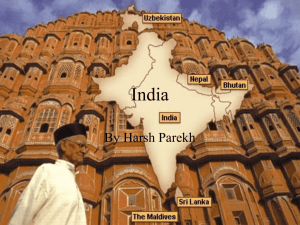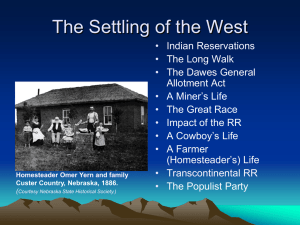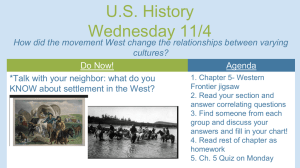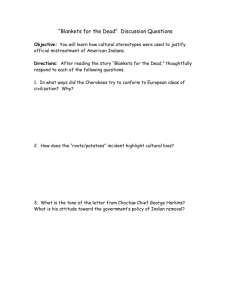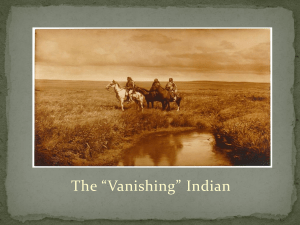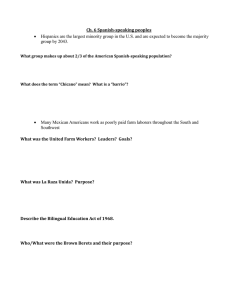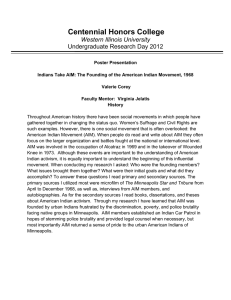– Unit 9, Chapter 26 (12 Ed.)
advertisement
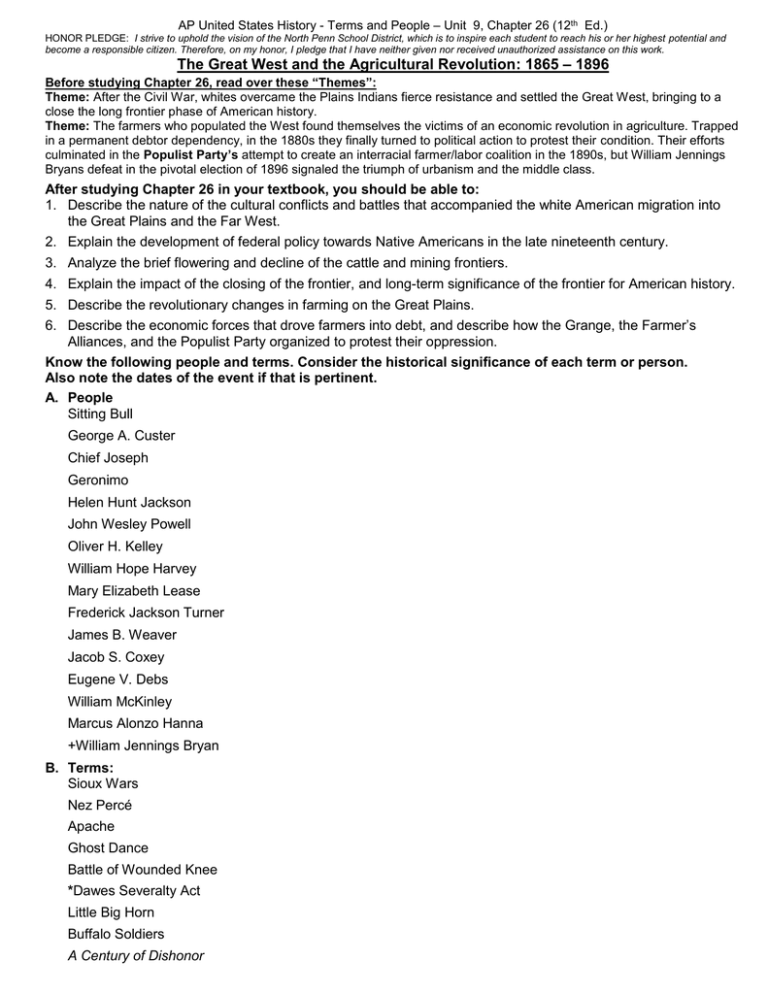
AP United States History - Terms and People – Unit 9, Chapter 26 (12th Ed.) HONOR PLEDGE: I strive to uphold the vision of the North Penn School District, which is to inspire each student to reach his or her highest potential and become a responsible citizen. Therefore, on my honor, I pledge that I have neither given nor received unauthorized assistance on this work. The Great West and the Agricultural Revolution: 1865 – 1896 Before studying Chapter 26, read over these “Themes”: Theme: After the Civil War, whites overcame the Plains Indians fierce resistance and settled the Great West, bringing to a close the long frontier phase of American history. Theme: The farmers who populated the West found themselves the victims of an economic revolution in agriculture. Trapped in a permanent debtor dependency, in the 1880s they finally turned to political action to protest their condition. Their efforts culminated in the Populist Party’s attempt to create an interracial farmer/labor coalition in the 1890s, but William Jennings Bryans defeat in the pivotal election of 1896 signaled the triumph of urbanism and the middle class. After studying Chapter 26 in your textbook, you should be able to: 1. Describe the nature of the cultural conflicts and battles that accompanied the white American migration into the Great Plains and the Far West. 2. Explain the development of federal policy towards Native Americans in the late nineteenth century. 3. Analyze the brief flowering and decline of the cattle and mining frontiers. 4. Explain the impact of the closing of the frontier, and long-term significance of the frontier for American history. 5. Describe the revolutionary changes in farming on the Great Plains. 6. Describe the economic forces that drove farmers into debt, and describe how the Grange, the Farmer’s Alliances, and the Populist Party organized to protest their oppression. Know the following people and terms. Consider the historical significance of each term or person. Also note the dates of the event if that is pertinent. A. People Sitting Bull George A. Custer Chief Joseph Geronimo Helen Hunt Jackson John Wesley Powell Oliver H. Kelley William Hope Harvey Mary Elizabeth Lease Frederick Jackson Turner James B. Weaver Jacob S. Coxey Eugene V. Debs William McKinley Marcus Alonzo Hanna +William Jennings Bryan B. Terms: Sioux Wars Nez Percé Apache Ghost Dance Battle of Wounded Knee *Dawes Severalty Act Little Big Horn Buffalo Soldiers A Century of Dishonor AP United States History - Terms and People – Unit 9, Chapter 26 (12th Ed.) HONOR PLEDGE: I strive to uphold the vision of the North Penn School District, which is to inspire each student to reach his or her highest potential and become a responsible citizen. Therefore, on my honor, I pledge that I have neither given nor received unauthorized assistance on this work. Comstock Lode Long Drive Homestead Act (1862) *Pacific Railway Act (1862) *Morrill Land Grant Act (1862) Sooner State safety-valve theory bonanza farms National Grange Granger laws Farmers' Alliance Colored Farmers National Alliance Populist (People’s) Party Coin’s Financial School Coxey’s Army Pullman Strike Cross of Gold speech Gold Bugs “16 to 1” Dingley Tariff bill Gold Standard Act Woman Suffrage Association +=One of the 100 Most Influential Americans of All Time, as ranked by The Atlantic. Go to Webpage to see all 100. *=A 100 Milestone Document from the National Archive. Go to Webpage to link to these documents. C. Voices from the past: From this day forward all war between the parties to this agreement shall forever cease. The government of the United States desires peace, and its honor is hereby pledged to keep it. The Indians desire peace, and they now pledge their honor to maintain it. If bad men among the whites, or among other people subject to the authority of the United States, shall commit any wrong upon the person or property of the Indians, the United States will . . . proceed at once to cause the offender to be arrested and punished according to the laws of the United States, and also reimburse the injured for the loss sustained. If bad men among the Indians shall commit a wrong or depredation upon the person of any one, white, black, or Indian, subject to the authority of the United States, and at peace therewith, the Indians herein named solemnly agree that they will . . . deliver up the wrongdoer to the United States, to be tried and punished according to its laws. . . . *Treaty of Fort Laramie, April 29, 1868 What law have I broken? Is it wrong for me to love my own? Is it wicked for me because my skin is red? Because I am a [Lakota]; because I was born where my father lived; because I would die for my people and my country? Sitting Bull, 1877 I have heard talk and talk, but nothing is done. Good words do not last long unless they amount to something. Words do not pay for my dead people. They do not pay for my country, now overrun by white men. Good words will not give my people good health and stop them from dying. Good words will not get my people a home where they can live in peace and take care of themselves. I am TIRED of talk that comes to nothing. It makes my heart sick when I remember all the good words and broken promises. The earth is our mother. She should not be disturbed by hoe or plough. We want only to subsist on what she freely gives us. I believe much trouble and blood would be saved if we opened our hearts more. I will tell you in my way how the Indian sees things. The white man has more words to tell you how they look to him, but it does not require many words to speak the truth. If the white man wants to live in peace with the Indian...we can live in peace. There need be no trouble. Treat alt men alike..., give them all the same law. Give them all an even chance to live and grow. You might as well expect the rivers to run backward as that any man who is born a free man should be contented when penned up and denied liberty to go where he pleases. We only ask an even chance to live as other men live. We ask to be recognized as men. Let me be a free man....free to travel…free to stop...free to work...free to choose my own teachers...free to follow the religion of my Fathers…free to think and talk and act for myself. Chief Joseph of the Nez Perce in a speech before Congress, 1879 AP United States History - Terms and People – Unit 9, Chapter 26 (12th Ed.) HONOR PLEDGE: I strive to uphold the vision of the North Penn School District, which is to inspire each student to reach his or her highest potential and become a responsible citizen. Therefore, on my honor, I pledge that I have neither given nor received unauthorized assistance on this work. D. "KILL THE INDIAN, SAVE THE MAN" – What kind of attitude is this? Read on: "KILL THE INDIAN, SAVE THE MAN" Beginning in 1887, the federal government attempted to “Americanize” Native Americans, largely through the education of Native youth. By 1900 thousands of Native Americans were studying at almost 150 boarding schools around the United States. The U.S. Training and Industrial School founded in 1879 at Carlisle Barracks, Pennsylvania, was the model for most of these schools. Boarding schools like Carlisle provided vocational and manual training and sought to systematically strip away tribal culture. They insisted that students drop their Indian names, forbade the speaking of native languages, and cut off their long hair. Not surprisingly, such schools often met fierce resistance from Native American parents and youth. But some Indian young people responded positively, or at least ambivalently, to the boarding schools, and the schools also fostered a sense of shared Indian identity that transcended tribal boundaries. The following excerpt from a paper read by Carlisle founder Capt. Richard C. Pratt at an 1892 convention spotlights Pratt’s pragmatic and frequently brutal methods for “civilizing” the “savages,” including his analogies to the education and “civilizing” of African Americans. ************************************************ A great general has said that the only good Indian is a dead one, and that high sanction of his destruction has been an enormous factor in promoting Indian massacres. In a sense, I agree with the sentiment, but only in this: that all the Indian there is in the race should be dead. Kill the Indian in him, and save the man.... The Indians under our care remained savage, because forced back upon themselves and away from association with English-speaking and civilized people [as a result of segregation on isolated reservations], and because of our savage example and treatment of them. . . . We have never made any attempt to civilize them with the idea of taking them into the nation, and all of our policies have been against citizenizing and absorbing them. Although some of the policies now prominent are advertised to carry them into citizenship and consequent association and competition with other masses of the nation, they are not, in reality, calculated to do this.... We make our greatest mistake in feeding our civilization to the Indians instead of feeding the Indians to our civilization. America has different customs and civilizations from Germany. What would be the result of an attempt to plant American customs and civilization among the Germans in Germany, demanding that they shall become thoroughly American before we admit them to the country? Now, what we have all along attempted to do for and with the Indians is just exactly that, and nothing else. We invite the Germans to come into our country and communities, and share our customs, our civilization, to be of it; and the result is immediate success. Why not try it on the Indians? Why not invite them into experiences in our communities? Why always invite and compel them to remain a people unto themselves? It is a great mistake to think that the Indian is born an inevitable savage. He is born a blank, like all the rest of us. Left in the surroundings of savagery, he grows to possess a savage language, superstition, and life. We, left in the surroundings of civilization, grow to possess a civilized language, life, and purpose. Transfer the infant white to the savage surroundings, he will grow to possess a savage language, superstition, and habit. Transfer the savage-born infant to the surroundings of civilization, and he will grow to possess a civilized language and habit. These results have been established over and over again beyond all question; and it is also well established that those advanced in life, even to maturity, of either class, lose already acquired qualities belonging to the side of their birth, and gradually take on those of the side to which they have been transferred. As we have taken into our national family seven millions of Negroes, and as we receive foreigners at the rate of more than five hundred thousand a year, and assimilate them, it would seem that the time may have arrived when we can very properly make at least the attempt to assimilate our two hundred and fifty thousand Indians, using this proven potent line, and see if that will not end this vexed question and remove them from public attention, where they occupy so much more space than they are entitled to either by numbers or worth. The school at Carlisle is an attempt on the part of the government to do this. Carlisle has always planted treason to the tribe and loyalty to the nation at large. It has preached against colonizing Indians, and in favor of AP United States History - Terms and People – Unit 9, Chapter 26 (12th Ed.) HONOR PLEDGE: I strive to uphold the vision of the North Penn School District, which is to inspire each student to reach his or her highest potential and become a responsible citizen. Therefore, on my honor, I pledge that I have neither given nor received unauthorized assistance on this work. individualizing them. It has demanded for them the same multiplicity of chances which all others in the country enjoy. Carlisle fills young Indians with the spirit of loyalty to the stars and stripes, and then moves them out into our communities to show by their conduct and ability that the Indian is no different from the white or the colored, that he has the inalienable right to liberty and opportunity that the white and the negro have. Carlisle does not dictate to him what line of life he should fill, so it is an honest one. It says to him that, if he gets his living by the sweat of his brow, and demonstrates to the nation that he is a man, he does more good for his race than hundreds of his fellows who cling to their tribal communistic surroundings. . . . No evidence is wanting to show that, in our industries, the Indian can become a capable and willing factor if he has the chance. What we need is an Administration which will give him the chance. The Land in Severalty Bill can be made far more useful than it is, but it can be made so only by assigning the land so as to intersperse good, civilized people among them. If, in the distribution, it is so arranged that two or three white families come between two Indian families, then there would necessarily grow up a community of fellowship along all the lines of our American civilization that would help the Indian at once to his feet. Indian schools must, of necessity, be for a time, because the Indian cannot speak the language, and he knows nothing of the habits and forces he has to contend with; but the highest purpose of all Indian schools ought to be only to prepare the young Indian to enter the public and other schools of the country. And immediately he is so prepared, for his own good and the good of the country, he should be forwarded into these other schools, there to temper, test, and stimulate his brain and muscle into the capacity he needs for his struggle for life, in competition with us. The missionary can, if he will, do far greater service in helping the Indians than he has done; but it will only be by practicing the doctrine he preaches. As his work is to lift into higher life the people whom he serves, he must not, under any pretence whatsoever, give the lie to what he preaches by discountenancing the right of any individual Indian to go into higher and better surroundings, but, on the contrary, he should help the Indian to do that. If he fails in thus helping and encouraging the Indian, he is false to his own teaching. An examination shows that no Indians within the limits of the United States have acquired any sort of capacity to meet and cope with the whites in civilized pursuits who did not gain that ability by going among the whites and out from the reservations, and that many have gained this ability by so going out. Theorizing citizenship into people is a slow operation. What a farce it would be to attempt teaching American citizenship to the Negroes in Africa. They could not understand it; and, if they did, in the midst of such contrary influences, they could never use it. Neither can the Indians understand or use American citizenship theoretically taught to them on Indian reservations. They must get into the swim of American citizenship. They must feel the touch of it day after day, until they become saturated with the spirit of it, and thus become equal to it. When we cease to teach the Indian that he is less than a man; when we recognize fully that he is capable in all respects as we are, and that he only needs the opportunities and privileges which we possess to enable him to assert his humanity and manhood; when we act consistently towards him in accordance with that recognition; when we cease to fetter him to conditions which keep him in bondage, surrounded by retrogressive influences; when we allow him the freedom of association and the developing influences of social contact – then the Indian will quickly demonstrate that he can be truly civilized, and he himself will solve the question of what to do with the Indian. Official Report of the Nineteenth Annual Conference of Charities and Correction (1892), 46-59. Reprinted in Richard H. Pratt, “The Advantages of Mingling Indians with Whites,” Americanizing the American Indians: Writings by the “Friends of the Indian” 1880-1900 (Cambridge, Mass.: Harvard University Press, 1973), 260-271. E. Who were the Populists? Read on -> AP United States History - Terms and People – Unit 9, Chapter 26 (12th Ed.) HONOR PLEDGE: I strive to uphold the vision of the North Penn School District, which is to inspire each student to reach his or her highest potential and become a responsible citizen. Therefore, on my honor, I pledge that I have neither given nor received unauthorized assistance on this work. Populist Party - The People’s Party Rural discontent had brewed in the United States since the sharp decline of farm prices in the 1870s. Popular opinion tended to place the blame for the depressed economy on Eastern financial interests. The Greenback Party emerged as a force in national politics, leading the agitation for the currency's expansion. The temporary return of prosperity blunted the Greenback message, but the return of hard times in the 1880s led to emergence of the farmers' alliances. In December 1890, representatives from a number of the alliances met in Ocala, Florida to examine the issue of united political action. This initial foray into direct involvement came to nothing; allegiances to the Democratic Party still remained strong. Racism, as well as loyalty, played a role; some feared that splitting the Democratic vote would revive the old Republican-black alliance. Two events in 1890 paved the way for a new political party. First, Congress passed the Sherman Silver Purchase Act, a totally inadequate gesture toward currency expansion. Second, Republicans in Congress chose to withhold support from a bill to enforce civil rights in the South, thus ending any hope for cooperation between the former slaves and the party of Lincoln. Into this void moved figures like Tom Watson of Georgia, who urged Southern white farmers to overcome their antipathy toward blacks because both groups were suffering at the hands of the same oppressors. Election of 1892 Neither the Republicans nor the Democrats addressed rural distress in terms sufficient to encourage the farmers of the West and South. As a result, a convention was held in Omaha, Nebraska in February 1892. Many members of the powerful farmers' alliances were present. The name "populist" (from the Latin populus, meaning people) was borrowed from a state political organization in Kansas. The Populist convention nominated a truly national ticket: o James B. Weaver of Iowa, a former Greenback candidate and Union general, for president o James G. Field of Virginia, a former Confederate general, for vice president. The Populist platform, backed by nearly religious fervor, advocated an array of progressive ideas, many of which would later be adopted by law or amendment. The Populists ran a surprisingly successful campaign in 1892, polling more than one million popular votes and electing several of their number to Congress. Their real expectation, however, was to prepare for a serious run four years later. Election of 1896 In 1896, the Populists gained control of the Democratic Party and engineered the nomination of William Jennings Bryan. The campaign was dominated by the silver issue. In a futile effort to assert their independence, however, the Populists refused to support the Democratic vice presidential candidate and instead nominated Thomas E. Watson of Georgia to run with Bryan. An energetic campaign failed to sway the electorate, except in the farm belt. The Republicans were returned to power and the Populists were badly split between those who wished to remain with the Democrats and those who wanted to reclaim their identity. Election of 1900 The depression of the 1890s had subsided and much of the fervor for silver had declined. Nevertheless, many Populist Party members elected to cast their lot with Bryan and the Democrats in 1900. A small minority of Populists refused to endorse "fusion," nominating Wharton Barker and Ignatius Donnelly instead. The duo finished at the bottom of the heap, outpolled even by the Prohibition and Socialist tickets. Clearly the Populist Party had become too closely identified with free silver and that issue had vanished. Election of 1904 In 1904, the Populist Party was reunited, but sorely lacked numbers. Thomas Watson, a former vice presidential candidate, was nominated to run with Thomas Tibbles. The Populists won fewer than 120,000 popular votes and none in the Electoral College. Election of 1908 Tom Watson was trotted for a final round in 1908, paired with Samuel Williams. The ticket polled fewer than 30,000 votes, effectively ending the Populist Party's short life. The Populist effort was probably doomed from the start. They advanced a number of stellar ideas, but fell prey to the allure of free silver, an issue that resonated poorly with urban workers whose votes were badly needed. Discontented farmers, despite their enthusiasm, simply lacked the numbers to move the nation. F. Reading a chart: Why was the political power of the farmer diminishing? AP United States History - Terms and People – Unit 9, Chapter 26 (12th Ed.) HONOR PLEDGE: I strive to uphold the vision of the North Penn School District, which is to inspire each student to reach his or her highest potential and become a responsible citizen. Therefore, on my honor, I pledge that I have neither given nor received unauthorized assistance on this work. Farm Population in the United States % of Year and Total Total population U.S. Population Number Of who were Farmers farmers 1790 3,929,214 90.0% 1840 - 17,069,453 9,012,000 69.0% 1850 - 23,191,786 11,680,000 64.0% 1860 - 31,443,321 15,141,000 58.0% 1870 - 38,558,371 18,373,000 53.0% 1880 - 50,155,783 22,981,000 49.0% 1890 - 62,941,714 29,414,000 43.0% 1900 - 75,994,266 29,414,000 38.0% 1910 - 91,972,266 32,077,000 31.0% 1920 - 105,710,620 31,614,269 27.0% 1930 - 122,775,046 30,455,350 21.0% 1940 - 131,820,000 30,840,000 18.0% 1950 - 151,132,000 25,058,000 12.2% 1960 - 180,007,000; 15,635,000 8.3% 1970 - 204,335,000 9,712,000 4.6% 1980 - 227,020,000 6,051,000 3.4% 1990 - 261,423,000; 2,987,552 2.6% 2000 - 275,000,000 Total # of farms 1,449,000 2,044,000 2,660,000 4,009,000 4,565,000 5,740,000 6,366,000 6,454,000 6,295,000 6,102,000 5,388,000 3,711,000 2,780, 000 2,439,510 2,143,150
